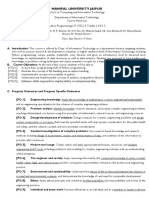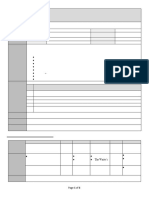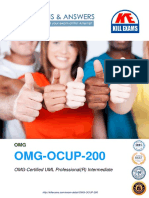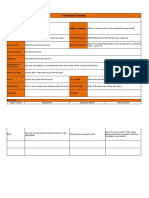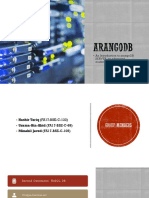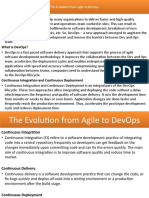HDD ProgrammingFundamentals
Uploaded by
Gokul KumarHDD ProgrammingFundamentals
Uploaded by
Gokul KumarProgramming Fundamentals
Course Description
Course number LA06 Course name Programming Fundamentals
Author K. K. P. Chanduka /
Heena Mehta
Pre-requisites for attending course
CHSSC and SDM
Stream P Target SE Compe P Type E Catego SE
(Eg. Project M Role1 tencies (E- ry3
2
Mgmnt / (Eg. (TK, Essenti (Eg.PL
Customer SE/PA/ P, T, al, D- /OS/D
Interface / PM D, A, Desira B/NM/
Consulting etc.) PS) ble) SE/TO
etc.) )
Estimated course 7 days (12 hrs of lecture (@3.0 hr/day, 24 hrs of lab, 20 hrs of project)
duration
Course Objectives
Sl# Objective Demonstrable knowledge/skills
1. To enable the participants to solve problems Ability to think, analyze and write succinct,
using the top down approach. clear and efficient algorithm for a given
problem
2. To enable the participants to solve problems Ability to write modular programs using
using modular approach through use of concept to functions. Understand the various
functions. categories of functions such as iterative /
recursive and normal functions
3. To introduce various error Handling Debugging and Tracing errors using editor
Techniques
4. To introduce the participants to structured Ability to write structured code making use of
programming and data structures; to illustrate data structures with c as a programming
the use of data structures and structured language
statements to write good and efficient code.
5 To enable participants to understand and Ability to write functions related to string
code string handling functions handling
6. To explain Sorting and Searching Ability to understand the standard sorting and
searching methods.
7. To introduce the concept of basic file Ability to use basic File handling functions
handling functions necessary for the Project needed for the project.
1
PM Stream (Choose one)-SE: Software Engineer, PA: Programmer Analyst, PM: Project Manager
2
Competencies (Choose appropriate ones)-TK:Technical Knowledge, P:Programming, T:Testing,
D:Design, A:Analysis, PS:Pre-sales.
3
Category (Choose one)-PL: Programming or Programming Language, OS: Operating Systems, DB: Database,
NM: Networks and Middleware, SE: Software Engg, TO: Technical Overview
ER/CORP/CRS/LA06/001 Version No. 2.0
Course Design
Sl# Unit name Unit objectives and keywords Lecture
Duration
(hrs.)
1. Introduction to Programming To introduce the different stages of 1.00 hrs.
Software life cycle; Programming
Methodologies; Different stages of
program life cycle
To introduce the participants to 1.00 hrs.
algorithmic thinking and how to
write Pseudo Code for a given
problem statement
To explain the basic data types, 0.5 hrs.
concept of variables, structured
programming constructs like loops,
if-else etc.
To appreciate good Programming 0.5 hrs
Style
2. Functions To explain how to solve a problem in 1.5 hrs
terms of sub-problems. To
demonstrate the reusability of
functions by solving bigger problems
using solutions of smaller problems
To explain the recursive and iterative 1.0 hrs
methods of solving a problem. To
explain the advantages and
disadvantages of recursive functions
Using editor for debugging programs To introduce the use of Editor tools 0.5 hrs
to trace and debug the errors
3. Arrays To introduce the concept of data 1.5 hrs.
structure. To explain arrays, array
processing, advantages and
disadvantages of using arrays.
4. Strings To introduce the participants with 1.5 hrs.
the basic string processing functions
like string concatenation, insertion,
find and replace etc.
5. Sorting and Searching To introduce the participants to the 1.5 hrs.
standard sorting and searching
methods.
File Handling functions File handling functions needed for 1.5 hrs
the project.
ER/CORP/CRS/LA06/001 Version No. 2.0
Sources
1. Trembley., Bunt, Introduction to Computer Science, McGraw Hill
2. Dromey R.G., How to solve it by computers, Prentice Hall of India, New Delhi, 1994.
3. Kernighan., Ritchie, ANSI C Language, Prentice Hall of India, New Delhi, 1992.
4. Sedgewick R., Algorithms in C(Third Edition), Addison Wesley, 1999.
5. Yashwant Kanitker, Let Us C, by Yashwant Kanitker, Second Edition
6. Programming in C, Schaum series, Third Edition
ER/CORP/CRS/LA06/001 Version No. 2.0
You might also like
- BSCS OBE Syllabus For Computer Programming 1No ratings yetBSCS OBE Syllabus For Computer Programming 17 pages
- Manipal University Jaipur: Object Orient C Programming - CA 1103 - 4 Credits - 3 1 0 4No ratings yetManipal University Jaipur: Object Orient C Programming - CA 1103 - 4 Credits - 3 1 0 47 pages
- Principles of Programming Languages - CS F30 - 2024_handoutNo ratings yetPrinciples of Programming Languages - CS F30 - 2024_handout6 pages
- 1-1 Lab Manual - Programming FundamentalsNo ratings yet1-1 Lab Manual - Programming Fundamentals147 pages
- Institute of Engineering & Technology, Devi Ahilya University, Indore, (M.P.), India. (Scheme Effective From July 2016)No ratings yetInstitute of Engineering & Technology, Devi Ahilya University, Indore, (M.P.), India. (Scheme Effective From July 2016)2 pages
- NEP-B.Sc. (Computer Science) - Sem. I & II - (Syllabus)No ratings yetNEP-B.Sc. (Computer Science) - Sem. I & II - (Syllabus)17 pages
- FIRST SEMESTER 2022-2023: of Programming Languages 10 Edition, Pearson, 2012.No ratings yetFIRST SEMESTER 2022-2023: of Programming Languages 10 Edition, Pearson, 2012.3 pages
- Syl CC 103 Fundamentals of Programming xxxNo ratings yetSyl CC 103 Fundamentals of Programming xxx6 pages
- IT1552 Python Programming Course Handout 2020No ratings yetIT1552 Python Programming Course Handout 20206 pages
- First Quarter: Computational Thinking: or SituationNo ratings yetFirst Quarter: Computational Thinking: or Situation2 pages
- Detailed Syllabus C Programming BIT102 (1)No ratings yetDetailed Syllabus C Programming BIT102 (1)6 pages
- ADP (Computing) 1st Programming Fundamental OutlineNo ratings yetADP (Computing) 1st Programming Fundamental Outline7 pages
- University of Caloocan City: College of Liberal Arts and SciencesNo ratings yetUniversity of Caloocan City: College of Liberal Arts and Sciences7 pages
- CS F111 Computer Programming I Sem 2022-2023 HONo ratings yetCS F111 Computer Programming I Sem 2022-2023 HO5 pages
- Comp Fundamentals and Programming - SyllabusNo ratings yetComp Fundamentals and Programming - Syllabus4 pages
- 02introduction To Programming Edip Senyureksyllabus20232024No ratings yet02introduction To Programming Edip Senyureksyllabus202320243 pages
- BSCS OBE Syllabus For Computer Programming 1100% (1)BSCS OBE Syllabus For Computer Programming 17 pages
- L T P C: Nirma University Institute of Technology B.Tech., All Branches Semester-I/IINo ratings yetL T P C: Nirma University Institute of Technology B.Tech., All Branches Semester-I/II2 pages
- Course_guidebook_Fundamentals of Programming II(IS)No ratings yetCourse_guidebook_Fundamentals of Programming II(IS)3 pages
- M1 FORMATIVE Fundamental Concepts and Intro To OOP DELOS REYESNo ratings yetM1 FORMATIVE Fundamental Concepts and Intro To OOP DELOS REYES7 pages
- EEB334 Computer Programming I Course Outline and Teaching Plan 2022No ratings yetEEB334 Computer Programming I Course Outline and Teaching Plan 20223 pages
- National University: CS118 - Programming FundamentalsNo ratings yetNational University: CS118 - Programming Fundamentals3 pages
- 90 - 48173 - FINALmaterial C and DS Course Handout 22-08-15No ratings yet90 - 48173 - FINALmaterial C and DS Course Handout 22-08-15156 pages
- 2020 - 04 - Introduction To Kubernetes RBACNo ratings yet2020 - 04 - Introduction To Kubernetes RBAC41 pages
- Java Chap7 Iteration Through Loops (Prof. Ananda M Ghosh)75% (4)Java Chap7 Iteration Through Loops (Prof. Ananda M Ghosh)14 pages
- Overview On DMEE Tree With PMW Config StepsNo ratings yetOverview On DMEE Tree With PMW Config Steps33 pages
- Assignment 7 - Software Engineering - 2023 (1) .Updated 29th100% (1)Assignment 7 - Software Engineering - 2023 (1) .Updated 29th6 pages
- Lecture 01 - Getting Started, Compilation, Execution, Byte Code, Machine Code, JDK, JRE, JVM, JITNo ratings yetLecture 01 - Getting Started, Compilation, Execution, Byte Code, Machine Code, JDK, JRE, JVM, JIT3 pages
- Car Rental System: Advanced Java Programming LabNo ratings yetCar Rental System: Advanced Java Programming Lab44 pages
- MIPS syscall functions available in MARSNo ratings yetMIPS syscall functions available in MARS1 page
- Binary Code Obfuscation Through C++ Template MetaprogrammingNo ratings yetBinary Code Obfuscation Through C++ Template Metaprogramming12 pages
- OMG-OCUP-200: OMG-Certified UML Professional (R) IntermediateNo ratings yetOMG-OCUP-200: OMG-Certified UML Professional (R) Intermediate7 pages
- Functional Testing System and Integration Test 1: IRCTC Web ApplicationNo ratings yetFunctional Testing System and Integration Test 1: IRCTC Web Application8 pages
- An Introduction To Arangodb Server, An Advanced Multimodel Nosql DatabaseNo ratings yetAn Introduction To Arangodb Server, An Advanced Multimodel Nosql Database47 pages
- 4 Visual Foxpro - An: Information and A Database Is An Organized Collection of RelatedNo ratings yet4 Visual Foxpro - An: Information and A Database Is An Organized Collection of Related11 pages
- Nested Classes: Constraints - Constraints Are Nothing But Horizontal and Vertical Distance Between Two ComponentNo ratings yetNested Classes: Constraints - Constraints Are Nothing But Horizontal and Vertical Distance Between Two Component3 pages
- Red Hat Enterprise Linux-9-Managing Idm Users Groups Hosts and Access Control RulesNo ratings yetRed Hat Enterprise Linux-9-Managing Idm Users Groups Hosts and Access Control Rules418 pages
- Arrays and Pointers in C: Alan L. Cox Alc@rice - EduNo ratings yetArrays and Pointers in C: Alan L. Cox Alc@rice - Edu26 pages
- Java Lab Assignments 2nd Year EngineeringNo ratings yetJava Lab Assignments 2nd Year Engineering20 pages

























